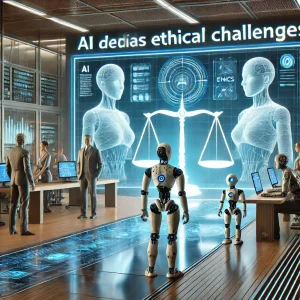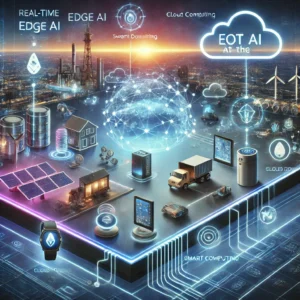The Ethical Challenges of Artificial Intelligence Development

The Ethical Challenges of Artificial Intelligence Development.
Explore the ethical challenges of artificial intelligence development, including privacy, bias, job displacement, and global governance. Learn how to navigate these issues for a responsible AI future.
Artificial Intelligence (AI) has become a cornerstone of technological advancement, revolutionizing industries from healthcare to transportation. However, with its rapid development comes a myriad of ethical challenges that need urgent attention. Balancing innovation with responsibility is critical for ensuring AI benefits society while minimizing harm.
—
1. Privacy Concerns in AI Applications
One of the most significant ethical challenges in AI is the issue of privacy. As AI systems increasingly rely on data to function effectively, they often process vast amounts of personal information.
Key Issues:
Data Collection: Many AI models collect sensitive user data without explicit consent.
Surveillance Risks: AI-powered surveillance systems can infringe on individual privacy.
Data Misuse: Improper use of collected data can lead to discrimination or unauthorized access.
Solution Pathways:
Implementing robust data protection laws, ensuring transparency, and adopting privacy-by-design principles can mitigate these risks.
READ ALSO: Top 7 Features to Look for in a Smartphone in 2024 .
—
2. Bias and Discrimination in AI Models
AI systems are only as good as the data they are trained on. If training data contains biases, the resulting AI system will perpetuate those biases.
Examples of Bias in AI:
Facial Recognition: Systems misidentifying individuals of certain ethnicities.
Hiring Algorithms: Favoring male candidates due to biased historical data.
Mitigation Strategies:
Use diverse datasets for training AI models.
Regularly audit AI systems for bias and inaccuracies.
—
3. Transparency and Accountability
AI systems often function as “black boxes,” meaning their decision-making processes are not easily understood. This lack of transparency raises ethical concerns about accountability.
Key Questions:
Who is responsible when an AI system makes an error?
How can we ensure that AI decisions are explainable and fair?
Recommendations:
Develop AI explainability tools to demystify decision-making processes.
Establish clear accountability frameworks for AI-related incidents.
—
4. Job Displacement and Economic Inequality
The rise of AI threatens to automate jobs across various sectors, potentially leading to widespread unemployment and economic inequality.
Affected Industries:
Manufacturing and logistics.
Retail and customer service.
Data entry and repetitive tasks.
Ethical Responses:
Promote reskilling and upskilling programs for affected workers.
Encourage the creation of AI systems that augment rather than replace human jobs.
—
5. Military Applications and Autonomous Weapons
The use of AI in military applications, particularly autonomous weapons, raises profound ethical questions about the sanctity of human life and the rules of war.
Potential Risks:
Lack of human oversight in critical decision-making.
Escalation of armed conflicts due to AI-driven precision weaponry.
Proposed Solutions:
International treaties regulating the use of AI in warfare.
Ensuring human involvement in life-and-death decisions.
—
6. AI and Misinformation
AI-powered tools like deepfakes and automated content generation have the potential to spread misinformation on an unprecedented scale.
Implications:
Undermining trust in media and institutions.
Facilitating election interference and propaganda.
Preventative Measures:
Develop algorithms to detect and flag AI-generated misinformation.
Educate the public on recognizing AI-manipulated content.
—
7. Ethical Use of AI in Healthcare
AI’s ability to analyze medical data and provide diagnoses presents both opportunities and ethical dilemmas.
Challenges:
Ensuring AI recommendations are accurate and unbiased.
Addressing the liability for incorrect diagnoses.
Ethical Guidelines:
Involve healthcare professionals in AI decision-making.
Prioritize patient safety and data security.
—
8. Global Governance and Regulation
The global nature of AI development makes it difficult to implement uniform regulations, leading to ethical inconsistencies across regions.
Current Issues:
Lack of international consensus on AI ethics.
Regulatory gaps in emerging markets.
Steps Forward:
Foster international collaboration to create standardized AI ethics frameworks.
Encourage governments to enact comprehensive AI legislation.
—
Conclusion
The ethical challenges of artificial intelligence development are complex and multifaceted, requiring input from policymakers, developers, and society at large. Addressing these challenges proactively will ensure that AI serves as a force for good, fostering innovation while safeguarding human rights and societal values.





